British actor Jack Hulbert (1892-1978) was a popular comedian of the 1930s with a trademark chiselled chin. In his musicals, he often appeared with his wife Cicely Courtneidge.
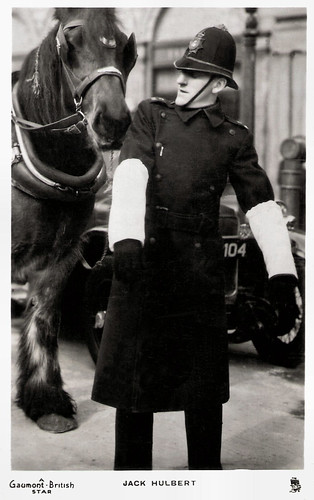
British postcard by Raphael Tuck & Sons 'Real Photograph', no. 15. Photo: Gaumont-British.
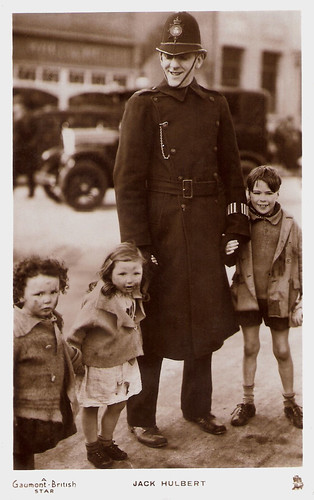
British postcard by Raphael Tuck & Sons 'Real Photograph', no. 16-8. Photo: Gaumont-British.
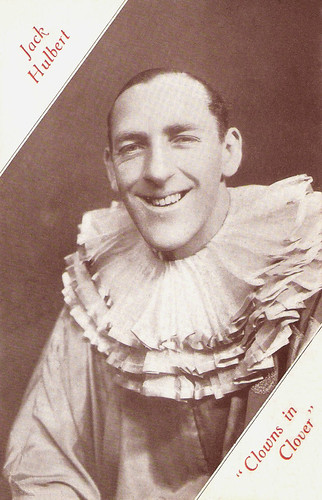
British postcard by Henry Good & Son. Promotion card for the stage musical 'Clowns in Clover' (1927) at the Adelphi Theatre in London.
John Norman ‘Jack’ Hulbert was born in Ely, Cambridgeshire, in 1892. He was the elder and more successful brother of Claude Hulbert.
Jack was educated at Cambridge and appeared in many shows and revues, mainly with the Cambridge Footlights. He was one of the earliest famous alumni of the comedy club.
After Cambridge, he earned recognition and fame performing in musicals and light comedies. He made his film debut in Elstree Calling (André Charlot, Jack Hulbert, Paul Murray, ánd Alfred Hitchcock (who directed some sketches), 1930), appearing opposite his wife and frequent stage and screen co-star Cicely Courtneidge whom he had married in 1916.
His career went through a successful period during the 1930s when he appeared in several films including The Ghost Train (Walter Forde, 1931) with Cicely Courtneidge, Love on Wheels (Victor Saville, 1932) with Edmund Gwenn, and Bulldog Jack (Walter Forde, 1935), a tongue-in-cheek homage to the popular Bulldog Drummond films in which Jack was supported by his brother Claude and King Kong’s mate Fay Wray.
He also wrote and directed some films such as Falling for You (Jack Hulbert, Robert Stevenson, 1933) with Cicely Courtneidge and Tamara Desni, the daughter of silent star Xenia Desni.
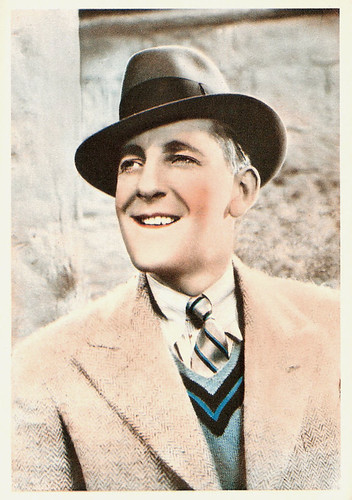
British collectors card by De Reszke Cigarettes, no. 30. Photo: Gaumont-British.
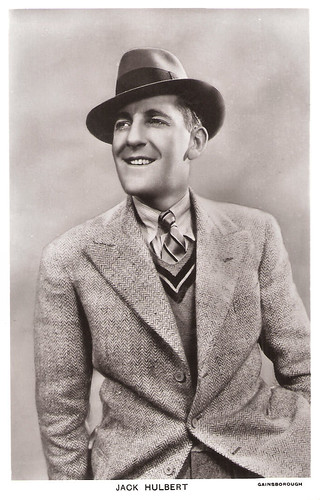
British postcard in the Picturegoer Series, London, no. 782. Photo: Gainsborough.
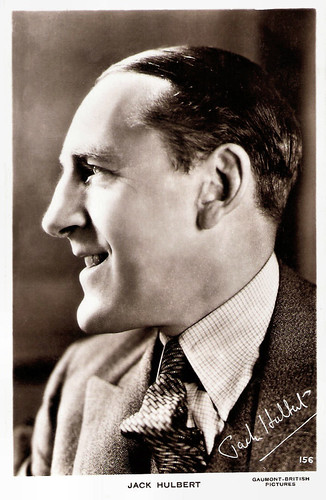
British postcard by Real Photograph, no. 156. Photo: Gaumont-British Pictures.
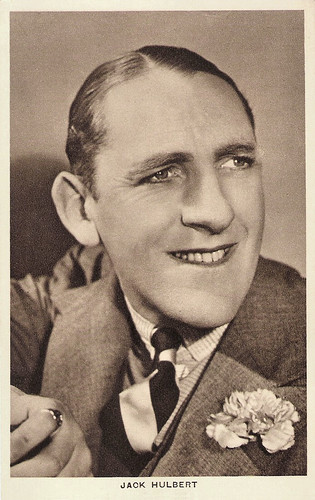
British card.
Jack Hulbert's popularity waned as the 1930s came to an end. Some of his later films were Jack of All Trades (Jack Hulbert, Robert Stevenson, 1936) and Paradise for Two (Thornton Freeland, 1938) with Patricia Ellis and Googie Withers. During the 1940s, he was a Commandant in the Metropolitan Special Constabulary, stationed at Vine Street police station in London's West End.
After the war, he and his wife continued to entertain chiefly on stage. Among his later films were Into the Blue (Herbert Wilcox, 1950) starring Michael Wilding, and the crime film Miss Tulip Stays the Night (Leslie Arliss, 1955) starring Diana Dors.
On TV he was seen in episodes of Kraft Mystery Theater (1961), Compact (1964), Theatre 625 (1968), and Father Dear Father (1972). In 1962 he, along with his wife, Cicely Courtneidge, plus Vic Oliver, appeared in the BBC radio sitcom 'Discord in Three Flats' His final film was The Cherry Picker (Peter Curran, 1974) starring Lulu.
In 1975, Hulbert's autobiography, 'The Little Woman's Always Right', was published. His marriage to Cicely Courtneidge lasted for 62 years until his death. Their relationship is mentioned in the British television series Dad's Army in the episode Ring Dem Bells when Hulbert pulls out of shooting a Home Guard training film to spend time with his wife.
Jack Hulbert died, aged 85, at his home in Westminster, London, in 1978.

With Cicely Courtneidge. British postcard in the Rotary Photographic Series, no. 11673 A. Photo: Foulsham & Banfield.
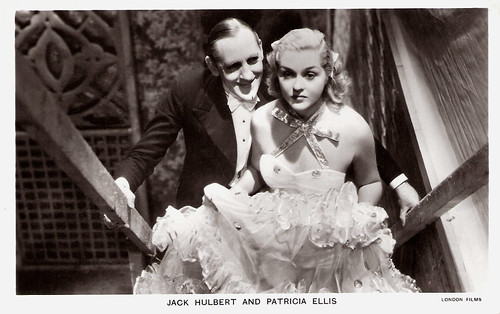
British postcard in the Film Partners Series, London, no. P 241. Photo: London Films. Publicity still for Paradise for Two/Gaiety Girls (Thornton Freeland, 1937) with Jack Hulbert and Patricia Ellis.

With Cicely Courtneidge. British postcard in the Film Partners Series, no. P 42. Photo: Gainsborough Pictures.
Sources: Wikipedia, and IMDb.
This post was last updated on 31 October 2024.

British postcard by Raphael Tuck & Sons 'Real Photograph', no. 15. Photo: Gaumont-British.

British postcard by Raphael Tuck & Sons 'Real Photograph', no. 16-8. Photo: Gaumont-British.

British postcard by Henry Good & Son. Promotion card for the stage musical 'Clowns in Clover' (1927) at the Adelphi Theatre in London.
Famous alumni of the Comedy Club
John Norman ‘Jack’ Hulbert was born in Ely, Cambridgeshire, in 1892. He was the elder and more successful brother of Claude Hulbert.
Jack was educated at Cambridge and appeared in many shows and revues, mainly with the Cambridge Footlights. He was one of the earliest famous alumni of the comedy club.
After Cambridge, he earned recognition and fame performing in musicals and light comedies. He made his film debut in Elstree Calling (André Charlot, Jack Hulbert, Paul Murray, ánd Alfred Hitchcock (who directed some sketches), 1930), appearing opposite his wife and frequent stage and screen co-star Cicely Courtneidge whom he had married in 1916.
His career went through a successful period during the 1930s when he appeared in several films including The Ghost Train (Walter Forde, 1931) with Cicely Courtneidge, Love on Wheels (Victor Saville, 1932) with Edmund Gwenn, and Bulldog Jack (Walter Forde, 1935), a tongue-in-cheek homage to the popular Bulldog Drummond films in which Jack was supported by his brother Claude and King Kong’s mate Fay Wray.
He also wrote and directed some films such as Falling for You (Jack Hulbert, Robert Stevenson, 1933) with Cicely Courtneidge and Tamara Desni, the daughter of silent star Xenia Desni.

British collectors card by De Reszke Cigarettes, no. 30. Photo: Gaumont-British.

British postcard in the Picturegoer Series, London, no. 782. Photo: Gainsborough.

British postcard by Real Photograph, no. 156. Photo: Gaumont-British Pictures.

British card.
The little woman's always right
Jack Hulbert's popularity waned as the 1930s came to an end. Some of his later films were Jack of All Trades (Jack Hulbert, Robert Stevenson, 1936) and Paradise for Two (Thornton Freeland, 1938) with Patricia Ellis and Googie Withers. During the 1940s, he was a Commandant in the Metropolitan Special Constabulary, stationed at Vine Street police station in London's West End.
After the war, he and his wife continued to entertain chiefly on stage. Among his later films were Into the Blue (Herbert Wilcox, 1950) starring Michael Wilding, and the crime film Miss Tulip Stays the Night (Leslie Arliss, 1955) starring Diana Dors.
On TV he was seen in episodes of Kraft Mystery Theater (1961), Compact (1964), Theatre 625 (1968), and Father Dear Father (1972). In 1962 he, along with his wife, Cicely Courtneidge, plus Vic Oliver, appeared in the BBC radio sitcom 'Discord in Three Flats' His final film was The Cherry Picker (Peter Curran, 1974) starring Lulu.
In 1975, Hulbert's autobiography, 'The Little Woman's Always Right', was published. His marriage to Cicely Courtneidge lasted for 62 years until his death. Their relationship is mentioned in the British television series Dad's Army in the episode Ring Dem Bells when Hulbert pulls out of shooting a Home Guard training film to spend time with his wife.
Jack Hulbert died, aged 85, at his home in Westminster, London, in 1978.

With Cicely Courtneidge. British postcard in the Rotary Photographic Series, no. 11673 A. Photo: Foulsham & Banfield.

British postcard in the Film Partners Series, London, no. P 241. Photo: London Films. Publicity still for Paradise for Two/Gaiety Girls (Thornton Freeland, 1937) with Jack Hulbert and Patricia Ellis.

With Cicely Courtneidge. British postcard in the Film Partners Series, no. P 42. Photo: Gainsborough Pictures.
Sources: Wikipedia, and IMDb.
This post was last updated on 31 October 2024.
No comments:
Post a Comment